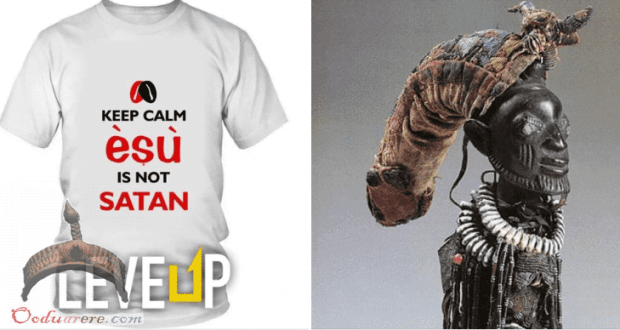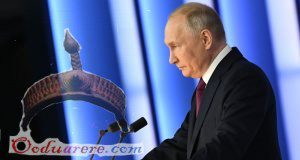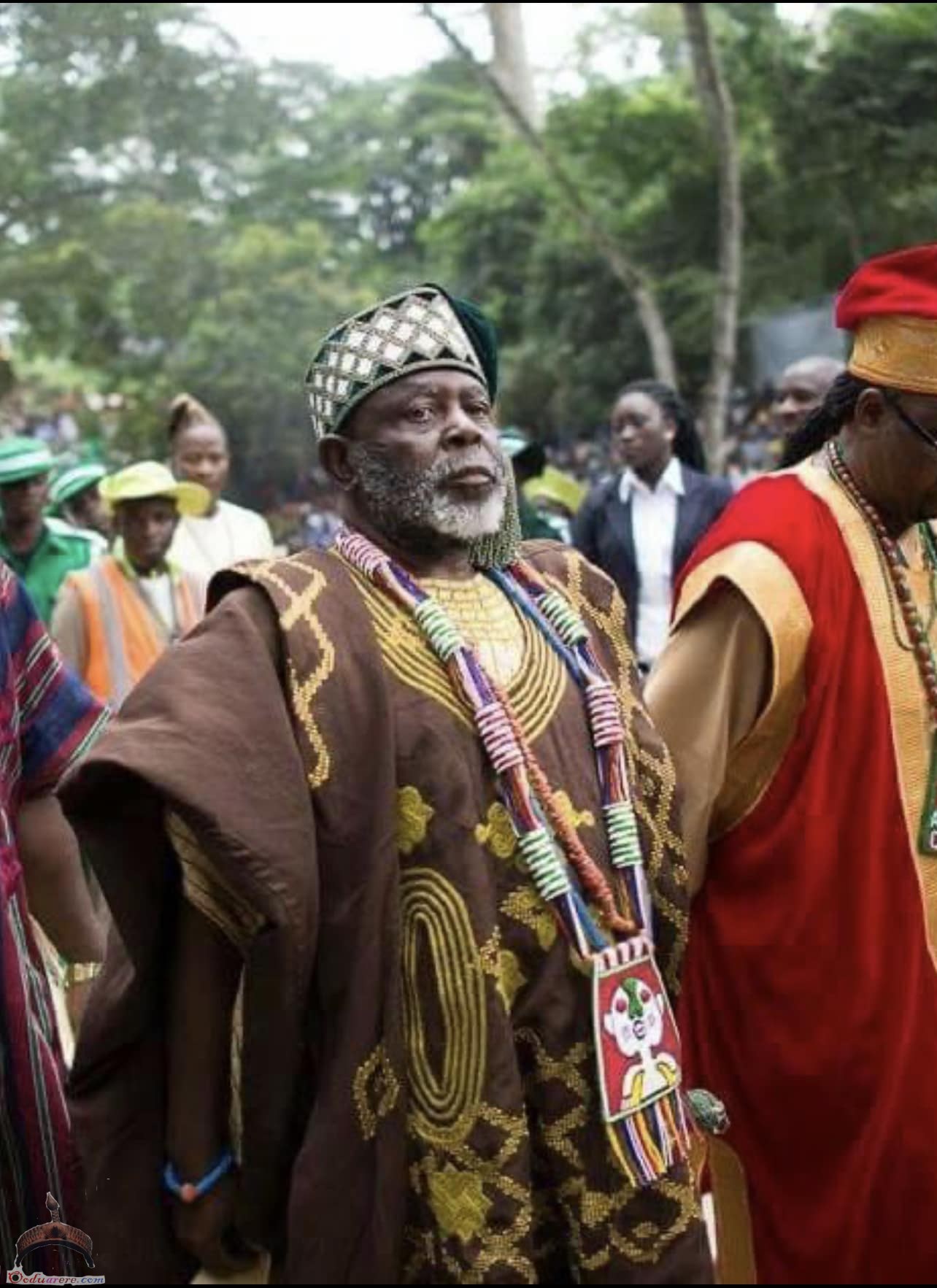We may not have this issue in our country Trinidad and Tobago but we support our brothers and sisters who may have this challenge Nigeria and the world may Esu hear our call and fix this situation.
ABORU ABỌYE ÀBÓSÍSE I AM AWO AWOSANMI ADEWALE SANGODELE ATINUMO
HEAD OF THE TEMPLE ILE ÌJÓSÌN ABALAYE OFUN IKA
OF TRINIDAD AND TOBAGO
ESU IS NOT SATAN
ESU IS NOT SATAN
ESU IS NOT SATAN
ESU YOU ARE THE IMOLE THAT WE CALL UPON TO BRING BALANCE TO ALL OUR TRADITIONAL WORKS
A-bá-ni-wá-ọ̀ràn-bá-ò-rí-dá: Who is He?
Ẹlẹ́jẹ̀lú
Ọbasìn
Láarúmọ̀
Ajọ́ńgọ́lọ̀
Ọba Ọ̀dàrà
Onílé Oríta
Ọba nílé Kétu
Ẹlẹ́gbára Ọ̀gọ
Olóògùn Àjíṣà
Láàlú Ògiri Òkò
Láàlù Bara Ẹlẹ́jọ́
Láaróyè Ẹbọra tí jẹ́ Látọpa
These are the other names that belongs to Èṣù!
Now, who is Èṣù Láàlù Ẹlẹ́gbára Ọ̀gọ?
Èṣù is a prominent primordial Divinity (a delegated Irúnmọlẹ̀ sent by the Olódùmarè) who descended from Ìkọ̀lé Ọ̀run, and the Chief Enforcer of natural and divine laws – he is the Deity in charge of the law enforcement and orderliness.
Èṣù is so influencing, powerful, ever relevant, and ubiquitous to the extent of having every day of the whole four-day (ancient/traditional) Yorùbá week as his day of worship (Ọjọ́ Ọ̀ṣẹ̀) unlike all other Irúnmọlẹ̀s and Òrìṣàs (primordial Divinities and deified Ancestors cum Spirits); “ọjọ́ gbogbo ni ti Èṣù Ọ̀darà”.
This controversial cognomen; A-bá-ni-wá-ọ̀ràn-bá-ò-rí-dá (He-who-creates-problems-for-the-innocent) comprehensively explains how pervasive the complexity of the mischief and the level of the misunderstanding of the exact nature of this highly unpredictable Deity called Èṣù Ọba Ọ̀dàrà (who especially had his abode at crossroads) across all the strata of our society in general and spiritual communities in particular.
Èṣù is a very temperamental Deity in the pantheon of Yorùbá Deities, and the embodiment of two-edged swords approach to every and all issues. He is a very skillful Divinity who always does his work and performed his duties effectively in exceptional circumstances and extremely extraordinary ways.
He is actually a Personification of Mischief; he is the one who teaches everybody that there are always two sides or more to every issue. And this primordial spirit did superb things! He balanced and created directions. Èṣù is so necessary to an ordered life!
Èṣù is the real Messenger not only to the Olódùmarè but also to the other Irúnmọlẹ̀s/Òrìṣàs. He is also the intermediary between Ajoguns (evil spirits) to the Irúnmọlẹ̀s/Òrìṣàs and the ẹ̀dá èèyàn (human beings); he is the one who distributes, and also supervises the distribution of sacrifices (ẹbọ) to the Ajoguns; always.
Èṣù is always in the middle of divergent world forces. He controls and regulates the two extremes – the world of happiness, joy, and fulfillment, as well as the arena of destruction, hopelessness, and sorrow.
Èṣù always demands from those who have to give to those who demanded it within the premises of sacrifices, rituals, and propitiation. He maintains the delicate balance of good and bad – just and unjust. He protects towns and villages, Priests and Priestess (àwọn Ẹlẹ́gùn – tí wọ́n ní ẹ̀rẹ́ ní Ìpàkọ́, and Devotees and Awos against evil machinations. And he always favours those that performed the necessary and appropriate sacrifices (ẹbọs) and other forms of rituals; “ẹni tó bá rúbọ l’Èṣù ń gbè”!
On this, Ifá says in Ọ̀yẹ̀kú Òtúrúpọ̀n (Ọ̀yẹ̀kú-bàtúrúpọ̀n):
Orí eṣinṣin ò níná
Afì-ínìn-ín
Afì-ọ́hùn-ún
Ìrù ẹṣin ò gbébìkan
A dífá fún Bèlèké
Òkú Ìgbọ̀nná
Ọmọ olówó ẹyọ
Èṣù kóre wá
Ẹlẹ́gbára kóbi lọ
Bèlèké darí ọrọ̀ ṣáwo nílé
The housefly head bears no louse
It swings back
It swings fort
The horsetail swings pendulum-like
Cast Ifá divination for Bèlèké
Dead man in the city of Ìgbọ̀nná
The owner of cowries
Èṣù bring blessings
Ẹlẹ́gbára chase away evils
Bèlèké ushered wealth to the household of initiates.
Èṣù Láàlù is a bosom friend, working partner, confidant, and close associate of Ọ̀rúnmìlà Baraà mi Àgbọnnìrègún, the one who practices and teaches Ifá – an esoteric language of Olódùmarè (containing the divine message of life) through a very complex divinatory system, and who also teaches wisdom.
Ifá says in Ọ̀ṣá Ogbè (Ọ̀ṣálogbè):
Bí a bá rí ọlọ́rọ̀ ẹni
Ṣọ̀rọ̀-ṣọ̀rọ̀ ni àá dà
A dífá fún Ọ̀rúnmìlà
Ifá yí ò ma ṣe awo pẹ̀lú Èṣù Ọba Ọ̀dàrà
This is why the Babaláwos in the very ancient city of Ilé Ifẹ̀ used to praise Ọ̀rúnmìlà Baraà mi Àgbọnnìrègún as “Mòpó Ẹlẹ́jẹ̀lú” – the friend of the one who always loves animal blood.
Èṣù Láàlù left Ilé Ifẹ̀ and went to orílé Kétu where he actually enjoyed a large following and devotees, and he was very famous and popular with the king of the ancient city (now in the Republic of Benin).
He was later chased out of Kétu in controversial circumstances after his public fight with the monarch of the city – the Alákétu and returned back to Ilé Ifẹ̀ from where he later went to Ilé Adó Èkìtì to be living with Ọ̀rúnmìlà Baraà mi Àgbọnnìrègún, and both of them eventually returned to Òkè Ìtaṣẹ̀ in Ilé Ifẹ̀.
Here, Ifá says in Ọ̀wọ́rínṣogbè (Ọ̀wọ́rín – Ogbè):
Ìdúró ni wọ́n fi ohun odó fún odó
Ìbẹ̀rẹ̀ ni wọ́n fi ohun ọlọ fún ọlọ
A dífá fún Èṣù Ọ̀darà
Yóò fọ́ orí Alákétu
Ohun tí ẹ bá rí
Ẹ fún Èṣù
Kí Èṣù ó gbà
Kó lọ
Ohun ẹ rí
Ẹ f’Éṣù
Èṣù historical records, narratives and facts of history
Curiously, some educated Babaláwos, and for reasons best known to them are now busy themselves with the disgusting project of changing historical records and narratives and facts of history by asserting falsely that a particular terrorist/bandit and a mere historical figure who goes by the nickname, “Èṣù” is the “one and the same” our dear primordial Divinity popularly known as Èṣù Láàlù Ẹlẹ́gbára Ọ̀gọ – Ẹbọra tí jẹ́ Látọpa.
After the crushing defeat of the Ìlọrins at Òṣogbo in 1840 and Ìbàdàn ascendancy, the Ìlọrins ventured no more into the Ọ̀yọ́ provinces, except for the little help they endeavoured to give to the Ìbàdàns during the Batedo war, by attempting to besiege Ògbómọ̀ṣọ́, which ended disastrously for them. They appeared now to have recovered somewhat from their military depression, at least sufficiently to essay aggressive warfare into the Ẹ̀fọ̀n Districts.
A man called Èṣù, a native of Ìyè, a town between Ilémoso and Eluku who had been a slave at Ìlọrin was redeemed by one Lálẹ́yẹ for 12 heads of cowries, the later also redeemed one Òní for 25 heads of cowries and gave her to him as a wife. Èṣù, however, turned out to be a ne’er do well of a roving disposition, unfit for any trade. He left Ìlọrin and settled first at Ẹ̀gbẹ̀ then Ìtagi and finally at Ìṣàn, leading a predatory life in those regions, kidnapping peaceful traders, sparing none, and was particularly hard on the Ìlọrin traders. In that way he became a person of some importance in those parts; hence the Ìlọrins were now resolved upon capturing him alive.
Finding himself obnoxious to the Ìlọrins, he hastily declared his allegiance to the Ìbàdàns their great antagonist. Through the assistance of Olúòkun, a distinguished Ìbàdàn gentleman residing at Ìlá Ọ̀ràngún, he received an introduction to the Baṣọ̀run Olúyọ̀lé of Ìbàdàn (then living) who received him cordially, and in dismissing him, gave him a war standard and commended him to the care of Yemọja, his tutelary Deity, Olúyọ̀lé, being a very Orisa minded man in his own way. In his incursions, Èṣù never forgot his patron, for, during the Baṣọ̀run’s lifetime, he continually sent him slaves and booty in his raids. After the death of Baṣọ̀run Olúyọ̀lé, the Ìlọrins were resolved to besiege Èṣù at Òpìn where he then was.
Ali, the brave Balógun of Ìlọrin was entrusted with this expedition. He sought the alliance of the Ìbàdàn chiefs, as the relation between Èṣù and Ìbàdàn was only a personal one with the late Baṣọ̀run; and besides, the Ìbàdàns were somewhat under an obligation to Ìlọrins for assisting them in the futile siege of Ògbómọ̀ṣọ́ during the late Batedo war, but as a matter of fact in order to forestall his opponent. Although any pretext however small was quite sufficient as an excuse for the Ìbàdàns to mobilize, in this case only a junior war chief named Kòlọ́kọ́ with a small force was sent to represent the Ìbàdàns.
For three years, Òpìn held out heroically and was nearly baffled by the prowess of Ali when a sudden accident occurred which extinguished their hopes. Aganga Adoja, a noble citizen was the hero of the town; one-night Aganga was inspecting his magazine with a naked lamp in hand when suddenly a terrific explosion was heard and the hopes of Òpìn with her heroic defender perished together in a moment.
Èṣù escaped to Ìṣàn, thence to Ọyẹ́, and then to Ìkọ̀lé. These places were taken one after another as Èṣù was being pursued to be taken alive. He escaped finally to Ìjẹ̀lú, a place fortified by nature against primitive weapons of warfare, situated on a high hill, and surrounded for a mile on all sides by a thorny hedge and thickets, it was impenetrable to the Ìlọrins horse.
Ire ni o!
Reference:
The History of the Yorùbás by The Rev. Samuel Johnson.
Aderemi Ifaolepin Aderemi
(Olúwo Ifáòleèpin)
The Founder and Chief Coordinating Officer
Society for the Ifá Practice in Nigeria (SIPIN)
 Ọmọ Oòduà Naija Gist | News From Nigeria | Entertainment gist Nigeria|Networking|News.. Visit for Nigeria breaking news , Nigerian Movies , Naija music , Jobs In Nigeria , Naija News , Nollywood, Gist and more
Ọmọ Oòduà Naija Gist | News From Nigeria | Entertainment gist Nigeria|Networking|News.. Visit for Nigeria breaking news , Nigerian Movies , Naija music , Jobs In Nigeria , Naija News , Nollywood, Gist and more









